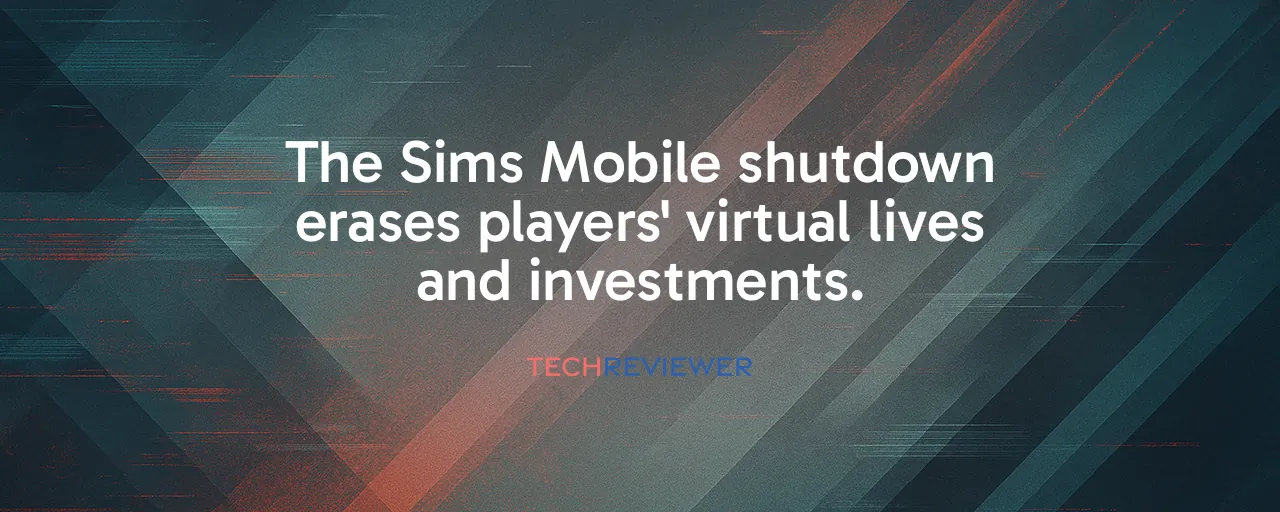A Virtual World Closes Its Doors
On January 20, 2026, The Sims Mobile will shut down. Electronic Arts announced that after seven years, the game's servers will shut down, leaving millions of players unable to access the virtual lives they've built since its 2018 launch. Homes, families, and legacies, crafted with care and often real money, will disappear overnight. Digital creations tied to publisher servers are fragile, and this shutdown underscores that reality.
For players, the loss stings. Some spent hundreds of dollars on SimCash for premium outfits or furniture, only to learn that EA's no-refund policy means unspent currency becomes worthless. Others poured years into multi-generational stories, retiring Sims to pass heirlooms down family lines. The emotional weight of losing these creations rivals the financial hit, especially for those who found comfort in the game's daily routines.
The Live Service Trap
The Sims Mobile's closure highlights the risks of live service games, where constant server connections keep gameplay alive but also tether it to a publisher's business decisions. Launched with over 100 million downloads by 2021 and earning $15 million in revenue in its first four months, the game thrived initially. The energy system, limiting actions like cooking or working to a depleting resource, frustrated players who wanted the open-ended freedom of The Sims 4.
EA's choice to shut down The Sims Mobile reflects a broader industry trend. In 2024 and 2025, mobile gaming revenue grew just 4% despite an 8% rise in playtime, signaling players are engaging but spending less. Publishers like EA now prioritize high-performers like EA Sports FC Mobile, which earns $170 million annually, over moderate successes. The Sims Mobile, generating an estimated $20-25 million in its first year, couldn't compete in a saturated market.
Lessons From Past Shutdowns
The Sims Mobile isn't the first game to face this fate, and it won't be the last. Ubisoft's 2024 shutdown of The Crew, a racing game that required constant online access, sparked outrage when players lost access to a primarily single-player experience. The backlash fueled the Stop Killing Games movement, which gathered 1.4 million signatures to demand offline options or clearer purchase terms. Unlike The Crew, The Sims Mobile's server-only architecture makes offline play impossible, leaving players with no way to preserve their creations.
Contrast this with Kingdom Hearts X, where developers provided an offline version when servers closed, allowing players to retain core gameplay. EA opted against this for The Sims Mobile, citing technical constraints. However, it unlocked all premium content for free on January 6, 2026, as a parting gesture. These cases show a spectrum of approaches, from player-friendly preservation to complete erasure, raising questions about what publishers owe their communities.
When Virtual Homes Vanish
The shutdown exposes a deeper issue: digital ownership. Players who bought SimCash or premium packs assumed they were purchasing lasting content, not renting temporary access. EA's terms of service clarify that virtual goods are licenses, not property, but the purchase process feels like ownership. This gap in expectation fuels distrust, especially when EA continued selling content weeks before announcing the shutdown on October 18, 2025.
In the European Union, where consumer laws demand digital goods remain functional for a reasonable time, regulators may question whether seven years is enough. The Stop Killing Games initiative pushes for mandatory offline modes or upfront warnings about games' finite lifespans. Without industry-wide standards, players face the same risk with every live service game, from mobile apps to AAA titles.
A Pivot to New Horizons
EA's focus is shifting to Project Rene, a cross-platform Sims experience that blends PC and mobile play with deeper customization than The Sims 4. The Sims Mobile's tech, like cloud-based saves and social features, helped pave the way, but its closure suggests EA sees it as redundant alongside The Sims FreePlay, which continues as a town-building alternative. This pivot comes amid EA's $55 billion acquisition in September 2025, a move that may push the company to streamline its portfolio for profitability.
For developers at Firemonkeys Studios, who took over from Maxis in 2019, the shutdown raises job security concerns, though some may shift to other projects. For players, it's a fresh start with no carryover of their Sims Mobile creations. The industry's move toward unified platforms and hybrid monetization that blends ads and subscriptions could reduce reliance on restrictive systems like energy bars, but only if publishers prioritize player trust.
Can Games Live Forever?
Game preservation remains a sticking point. Studies show 68% of online-only games become unplayable or at risk when servers shut down, with only 16 titles preserved through developer support and 110 via fan efforts. The Sims Mobile's proprietary architecture prevents fan preservation, unlike Toontown Online, where community servers kept the game alive. Without industry standards for offline modes or data exports, entire games vanish from cultural history.
Players, developers, and advocates could push for change. Publishers might adopt minimum notice periods, like six months, or design games with offline fallbacks from the start. Collaboration with preservation groups could archive gameplay footage or assets, even if playability fades. The Sims Mobile's end is a wake-up call: as gaming leans harder into live services, the industry must balance profits with the legacy of the worlds it creates.
